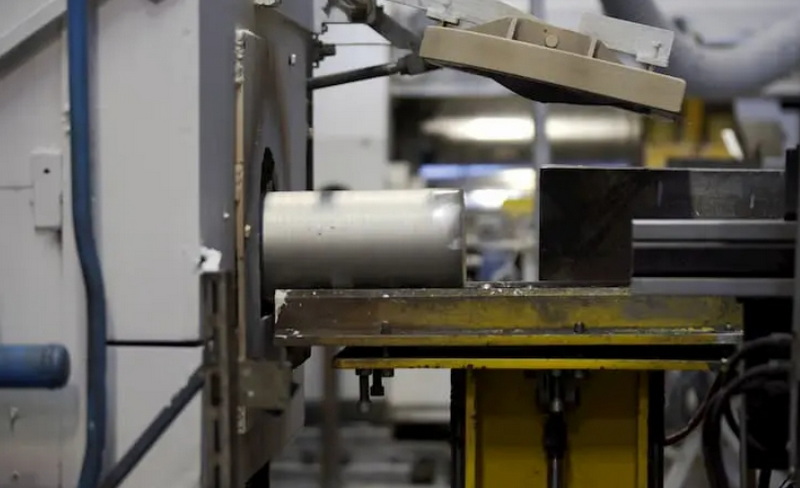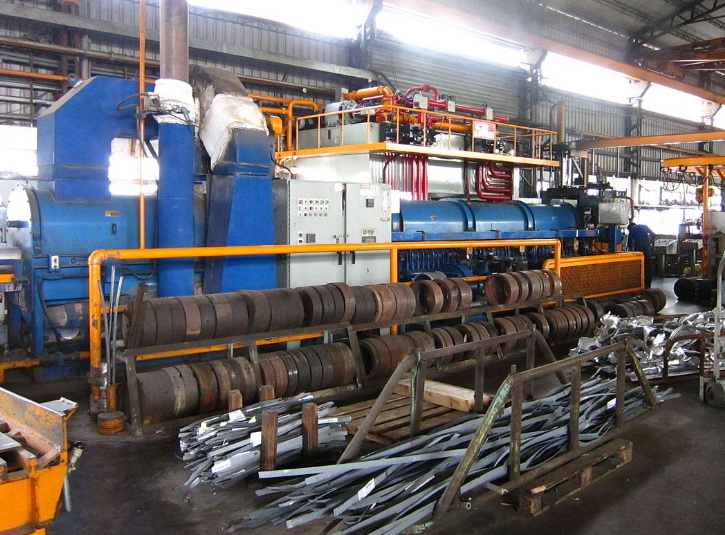Content Menu
● Understanding Extrusion Equipment Service in NJ
>> Why Is Regular Service Crucial?
● Key Factors Influencing Service Frequency
>> 1. Operating Hours and Production Intensity
>> 2. Materials Processed
>> 3. Machine Age and Technology
>> 4. Environmental Conditions
>> 5. Manufacturer Recommendations
● Recommended Service Intervals for Extrusion Equipment in NJ
>> Daily and Weekly Maintenance
>> Monthly Maintenance
>> Quarterly Maintenance (Every 3-4 Months)
>> Semi-Annual Maintenance (Every 6 Months)
>> Annual Maintenance
>> After 2500-5000 Operating Hours
● Seasonal Considerations for NJ Manufacturers
● Proactive vs. Reactive Maintenance
>> Benefits of Proactive Service
● Creating a Custom Maintenance Plan
● Common Service Tasks for Extrusion Equipment in NJ
● The Role of Spare Parts Planning
● Choosing a Service Provider for Extrusion Equipment in NJ
● Case Study: Improving Uptime with Scheduled Service
● Conclusion
● Frequently Asked Questions (FAQ)
>> 1. How often should extrusion equipment in NJ be fully disassembled for inspection?
>> 2. What are the signs that my extrusion equipment needs immediate service?
>> 3. How can I prepare my extrusion equipment for New Jersey's winter months?
>> 4. Is it necessary to keep spare parts on hand for extrusion equipment service in NJ?
>> 5. What should be included in a maintenance log for extrusion equipment?
● Citations:
Extrusion equipment is the backbone of many manufacturing operations in New Jersey, supporting industries from plastics and polymers to wire and cable production. Proper maintenance and timely service are essential to ensure optimal performance, minimize downtime, and extend the life of your machinery. But how often should you schedule extrusion equipment service in NJ? This comprehensive guide explores best practices, recommended service intervals, and actionable tips tailored to New Jersey's industrial climate.

Understanding Extrusion Equipment Service in NJ
Extrusion equipment service in NJ encompasses a broad range of activities, including routine inspections, preventive maintenance, repairs, and component replacements. The goal is to keep machines running smoothly, maintain product quality, and avoid costly unplanned outages.
Why Is Regular Service Crucial?
- Maximizes equipment lifespan
- Ensures consistent product quality
- Prevents unexpected breakdowns
- Improves energy efficiency
- Reduces long-term operating costs
Given New Jersey's competitive industrial landscape, proactive extrusion equipment service is not just recommended—it's vital for maintaining a strong market position.
Key Factors Influencing Service Frequency
Several variables impact how often you should schedule extrusion equipment service in NJ:
- Operating hours and production intensity
- Type of materials processed
- Machine age and technology
- Environmental conditions (humidity, dust, temperature)
- Manufacturer recommendations
Let's break down these factors:
1. Operating Hours and Production Intensity
Machines running 24/7 or at high loads require more frequent service. For example, extruders operating continuously may need maintenance every three to four months, while those with lighter usage might extend intervals to four or five months[4].
2. Materials Processed
Abrasive or corrosive materials accelerate wear on screws, barrels, and dies, necessitating more frequent inspections and part replacements[1][4].
3. Machine Age and Technology
Older equipment or machines lacking modern diagnostics may require closer monitoring and shorter service intervals. Newer extruders with advanced sensors can help optimize service timing[1].
4. Environmental Conditions
New Jersey's seasonal temperature swings and humidity can affect lubrication, cooling systems, and electrical components, requiring seasonal maintenance adjustments[3][5].
5. Manufacturer Recommendations
Always consult your equipment's manual or manufacturer guidelines for specific service intervals and procedures[2][6].
Recommended Service Intervals for Extrusion Equipment in NJ
While there is no universal schedule, industry best practices provide a solid framework for most extrusion equipment service in NJ:
Daily and Weekly Maintenance
- Clean machine surfaces and work areas
- Lubricate moving parts and check for leaks
- Tighten loose fasteners and inspect safety devices
- Monitor temperatures, pressures, and motor loads for anomalies[6]
Monthly Maintenance
- Inspect and clean filters, screens, and ventilation systems
- Check gearboxes and drive belts for wear
- Examine electrical cabinets for signs of overheating or loose connections
- Test emergency stop and safety interlocks[5]
Quarterly Maintenance (Every 3-4 Months)
- Conduct vibration and thermal imaging tests on gearboxes and motors
- Inspect screws, barrels, and dies for wear or damage
- Check and adjust alignment of couplings and shafts
- Replace worn seals, gaskets, and lubricants as needed[1][4]
Semi-Annual Maintenance (Every 6 Months)
- Remove and inspect all screw elements for cracks or excessive wear
- Recoat shafts with anti-seize compound
- Replace oil filter elements in hydraulic systems
- Clean condensers and water rollers in temperature control systems[1][5]
Annual Maintenance
- Change gearbox oil (every 4000-5000 hours or at least once per year)
- Perform comprehensive inspection and measurement of all major components
- Replace parts that have reached wear limits
- Review and update maintenance logs and PLC settings[3][5]
After 2500-5000 Operating Hours
- Schedule machine downtime for full disassembly and inspection
- Measure and identify wear on critical parts (screw, barrel, die)
- Replace or repair components as necessary[2][6]

Seasonal Considerations for NJ Manufacturers
New Jersey's winters and humid summers present unique challenges for extrusion equipment service:
- Winter: Drain water from pumps and cooling systems to prevent freezing and cracking; check electrical insulation and add anti-rust treatments to exposed parts[3][5].
- Summer: Ensure cooling systems are free of scale and blockages; monitor for overheating and adjust lubrication schedules as needed.
Proactive vs. Reactive Maintenance
Proactive, scheduled maintenance is always preferable to reactive repairs. Unplanned downtime can last weeks or months if critical parts are unavailable, disrupting production and damaging customer relationships[1].
Benefits of Proactive Service
- Predictable production schedules
- Lower repair costs
- Fewer emergency shutdowns
- Longer equipment lifespan
Creating a Custom Maintenance Plan
Every NJ facility is unique. To optimize extrusion equipment service, consider the following steps:
1. Audit your current maintenance practices
2. Log all service activities and machine parameters
3. Monitor key performance indicators (output rates, energy usage, product quality)
4. Work with local NJ service providers for tailored support
5. Train staff on preventive maintenance and safety protocols
Common Service Tasks for Extrusion Equipment in NJ
Below is a summary table of essential service tasks and their recommended frequency:
| Task | Frequency |
| Clean and lubricate moving parts | Daily/Weekly |
| Tighten fasteners, check safety devices | Weekly |
| Inspect filters, belts, and ventilation | Monthly |
| Vibration and thermal imaging tests | Quarterly |
| Inspect screws, barrels, and dies | Quarterly/Semi-Annually |
| Change gearbox oil | 4000-5000 hrs/Annually |
| Replace hydraulic oil filters | Semi-Annually |
| Disassemble and inspect major components | 2500-5000 hrs/Annually |
| Clean and protect cooling systems | Semi-Annually/Seasonally |
The Role of Spare Parts Planning
Long lead times for critical components are common. NJ manufacturers should:
- Maintain an inventory of high-wear spare parts (screws, barrels, seals)
- Establish relationships with local suppliers for rapid response
- Plan major overhauls during scheduled plant shutdowns[5]
Choosing a Service Provider for Extrusion Equipment in NJ
When selecting a partner for extrusion equipment service in NJ, consider:
- Experience with your specific equipment and industry
- Availability of emergency support
- Access to OEM parts and technical documentation
- Ability to provide diagnostics and predictive maintenance services
Case Study: Improving Uptime with Scheduled Service
A New Jersey plastics processor running three extrusion lines implemented a quarterly service schedule, including vibration analysis, screw inspections, and oil changes. Within a year, unplanned downtime dropped by 40%, and product quality complaints decreased by 30%. The investment in regular extrusion equipment service in NJ paid for itself through improved reliability and customer satisfaction.
Conclusion
Scheduling regular extrusion equipment service in NJ is essential for maximizing productivity, ensuring product quality, and controlling costs. While exact intervals vary based on usage, materials, and environment, most NJ manufacturers benefit from a combination of daily, monthly, quarterly, and annual maintenance activities. Proactive service—supported by thorough record-keeping and spare parts planning—protects your investment and keeps your operations running smoothly year-round.

Frequently Asked Questions (FAQ)
1. How often should extrusion equipment in NJ be fully disassembled for inspection?
Most experts recommend a full disassembly and inspection after every 2500-5000 hours of continuous operation. This allows for measurement of wear on critical parts and timely replacement or repair[2][6].
2. What are the signs that my extrusion equipment needs immediate service?
Common warning signs include unusual vibrations, abnormal noises, drops in output, inconsistent product quality, overheating, and visible wear or leakage. If any of these occur, schedule service immediately to prevent major failures[1][4].
3. How can I prepare my extrusion equipment for New Jersey's winter months?
Drain all water from pumps and cooling systems, add anti-rust oil to exposed parts, check electrical insulation, and ensure all moving parts are lubricated to prevent freezing and rusting[3][5].
4. Is it necessary to keep spare parts on hand for extrusion equipment service in NJ?
Yes, maintaining an inventory of high-wear spare parts (such as screws, barrels, seals) is crucial to minimize downtime, as some parts may have long lead times for delivery[5].
5. What should be included in a maintenance log for extrusion equipment?
A comprehensive maintenance log should record all service activities, inspections, part replacements, machine parameters (temperatures, pressures), and any anomalies detected. This documentation supports proactive maintenance and troubleshooting[1].
Citations:
[1] https://www.plasticsmachinerymanufacturing.com/extrusion/article/21156759/routine-extruder-upkeep-can-head-off-big-headaches
[2] http://www.chinaextruders.com/m/article/mojmFqLp6gSj.html
[3] https://www.jwellextrusions.com/tips-for-maintaining-plastic-extrusion-equipment-in-winter.html
[4] https://www.andersonintl.com/proven-best-practices-for-maintaining-a-high-shear-extruder-machine/
[5] https://www.jwellmachine.com/winter-maintenance-tips-for-plastic-extrusion-equipment/
[6] https://www.taizhengmachine.com/maintenance-of-wire-and-cable-extrusion-machine.html
[7] https://www.jstor.org/stable/44724226
[8] http://njcbmachine.com/en/news/3.html
[9] https://www.cowinextrusion.com/what-should-we-pay-attention-to-in-the-daily-maintenance-of-twin-screw-extruder/
[10] https://www.coperion.com/media/8960/b-600605_en_coperion_extruder_service_maintenance.pdf
[11] https://extruder-experts.com/en/services/maintenance-and-inspection
[12] https://jydjx.com/effective-maintenance-strategies-for-plastic-extrusion-machines/
[13] https://www.machine4aluminium.com/top-3-factors-that-affect-aluminum-extrusion-dies-cleaning-and-washing-efficiency/
[14] https://www.youtube.com/watch?v=Rf5DQR5qXxU
[15] https://www.snackandbakery.com/articles/91524-new-extrusion-equipment-offers-better-hygiene-speed-and-flexibility
[16] https://www.envelope.org/wp-content/uploads/2020/09/Henkel-Best-Practices-for-Extrusion-Seam-Gumming.pdf
[17] https://www.mernj.com/extrusion-screws-and-barrel-repairs.html
[18] https://www.linkedin.com/pulse/nine-main-points-aluminum-extrusion-press-machine-maintenance-
[19] https://extruders.leistritz.com/en-row/extrusion/brochures/leistritz-service-en.pdf
[20] https://www.indeed.com/q-extrusion-maintenance-technician-jobs.html
[21] https://raise.jobs/careers/extrusion-technician/
[22] https://extrudedplastics.com/category/new-jersey/
[23] https://tri-stateal.com/resources/extrusion-guide/
[24] https://construction-equipment-gw.nors.com/resources/blogs/how-often-should-heavy-equipment-be-serviced/
[25] https://sci-hub.se/downloads/2019-04-01/6b/bouvier2014.pdf
[26] https://ascendiacdmo.com/hot-melt-extrusion-formulation-manufacturing
[27] https://www.plasticsmachinerymanufacturing.com/extrusion/article/21156759/routine-extruder-upkeep-can-head-off-big-headaches
[28] https://www.lightmetalage.com/news/industry-news/extrusion/almag-to-revitalize-aluminum-extrusion-plant-in-new-jersey/
[29] https://www.linkedin.com/pulse/4-tips-help-you-maintaining-extrusion-general-work-w-jennifer?articleId=8523994494091986653
[30] https://www.academia.edu/21003168/Extrusion_The_Definitive_Processing_Guide_and_Handbook
[31] https://eworkorders.com/cmms-industry-articles-eworkorders/guide-to-programmable-logic-controller-maintenance/
[32] https://www.fortishd.com/ultimate-guide-to-maintenance-hour-intervals/
[33] https://www.njpt.com/plastic-extrusion-tooling/
[34] https://wenger.com/services-research/wenger-care-program
[35] https://esscoequipment.com/heavy-equipment-service.html






















